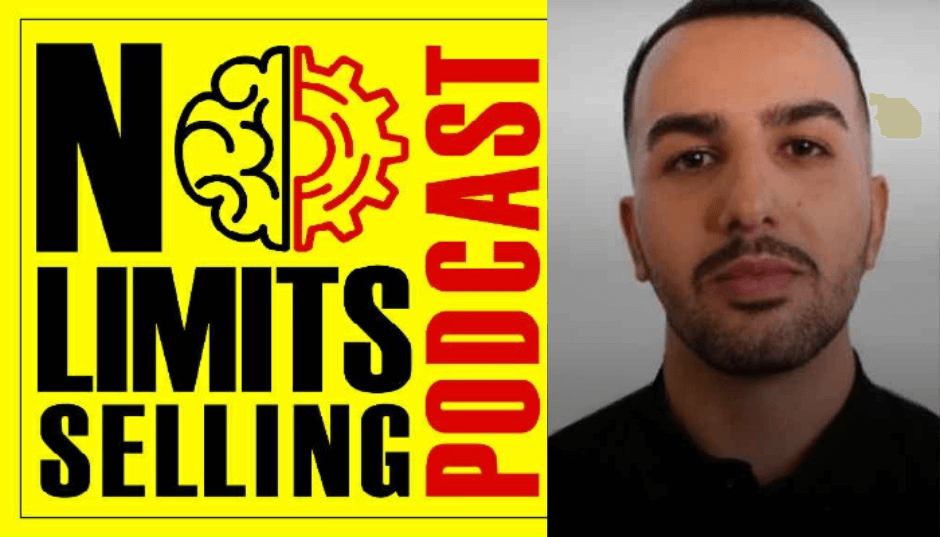Five Powerful Tips for Landing More Appointments
In today’s episode of The No Limits Selling Podcast, we have Pouya Haidar, Sales Training and Business Consultant who shares tips on how to land more appointments.
Pouya Haidar’s Tip: “Self-education is more valuable than formal education.”
Guest Bio:
Pouya Haidari is an Iranian-born, Canadian Entrepreneur and Sales Professional. By the age of 21, he was earning 6-figures a year and living in a luxury condo in the heart of Toronto. By 23, Pouya was earning multiple-6-figures per year and managing 5 regional sales offices of 60-70 sales professionals. And by the age of 24, he had multiple 7-figure partnership offers from companies and brands in Canada and the United States which he happily declined.

Find Pouya Haidar: Instagram, Twitter
[EDITOR’S NOTE: This podcast is sponsored by No Limits Selling. It is a fun, fast-paced podcast that delivers hard-fought business advice that you can implement today to improve your sales and performance]
Interested In Our Real Estate Coaching Services? Explore Our Website: Link
Feeling Not Well Today? You Can Use Our Mindset Boosters App To amp Up Your Mood: Link
Find us on Social Media:
LinkedIn | Facebook community | Instagram
Like what do you listen to? Subscribe to our podcast!
Ready to become fearless? We can help you become fearless in 60 days so you accomplish more in your career Schedule A 15 min Call with UmarSummary
Landing more appointments is a process that takes time and effort. By implementing these strategies and consistently reaching out to potential clients, you can increase your chances of success. Pouya Haidar and Umar discuss effective ways to land more appointments by simplifying the process into 5 simple steps. By providing online scheduling options or a clear phone number to call, making sure your calendar is up to date and easily accessible. Following up; Don't be afraid to follow up with potential clients who have shown interest but haven't yet committed to an appointment. A friendly reminder email or call can often make the difference.
Offer incentives: Consider offering incentives or rewards for booking appointments, such as a discount or free consultation. Build relationships: Cultivate relationships with potential clients through networking, social media, or other marketing efforts. Building trust and familiarity can increase the likelihood of booking an appointment. Be flexible: Offer a variety of appointment times and be willing to accommodate clients' schedules as much as possible. Provide value: Highlight the value of your services and demonstrate how they can benefit potential clients.
Offer helpful resources, such as free webinars or guides, to show your expertise and build trust. and finally, improve your online presence: Make sure your website and social media profiles are up-to-date and visually appealing. This can make a big difference in attracting potential clients and encouraging them to book appointments.
Introduction
Pouya Haidar is a professional with a dynamic and results-driven approach. He has a highly successful background in achieving profitable business growth. This has been accomplished through the creation and execution of successful sales and marketing strategies.
Professional Experience
Pouya Haidar has a rich professional experience in various fields. He has worked in sales, marketing, and business development roles across different industries. These include technology, finance, and healthcare. His track record shows that he has consistently driven sales growth, improved team performance, and strengthened customer relationships.
Skills and Expertise
Pouya Haidar is equipped with a wide range of skills and expertise. He excels in strategic planning, team leadership, and performance management. His proficiency also extends to business development, market analysis, and customer relationship management. These skills have been instrumental in his professional success.
Education
In terms of education, Pouya Haidar holds a Bachelor's degree in Business Administration and Management. This educational background has provided him with a solid foundation for his professional endeavors.
Contact Information
This podcast provides contact information for Pouya Haidar. This includes his email address and a link to his LinkedIn profile. This information allows for further professional connections and interactions.
Faq
1. Who is Pouya Haidar?
What is Pouya Haidar's professional experience?
What skills and expertise does Pouya Haidar possess?
What is Pouya Haidar's educational background?
How can I contact Pouya Haidar?
In which industries has Pouya Haidar worked?
What is Pouya Haidar's approach to sales and marketing?
Don’t miss this opportunity to transform your real estate career with one-on-one coaching. As an experienced real estate coach, I, Umar Hameed, am dedicated to helping you unlock your full potential and achieve your real estate goals. To learn more about who am I and my clients ↓
Follow This Link
If you’re ready to take the next step, book an appointment with me today and begin your journey toward success in the real estate industry.
